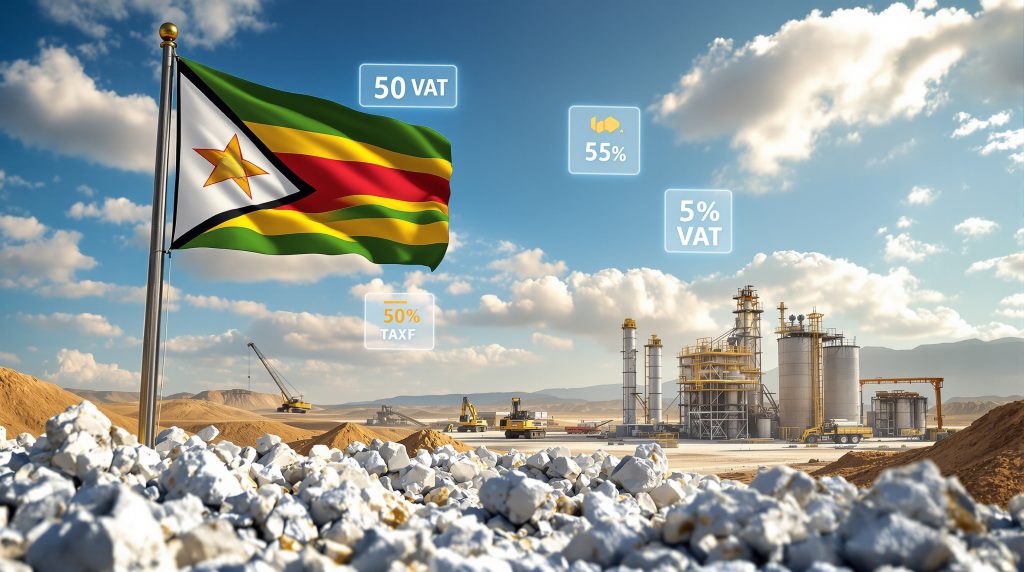Zimbabwe's Lithium Sector Faces Critical Crossroads as VAT Moratorium Request Sparks Regulatory Battle
Zimbabwe's lithium mining industry has submitted a formal request for government approval to defer the implementation of a 5% value-added tax on lithium concentrates until December 2026. This unprecedented Zimbabwe lithium VAT moratorium proposal has emerged from a complex web of regulatory disputes between mining operators and revenue authorities, creating uncertainty around when beneficiation requirements should trigger taxation obligations.
The southern African nation currently enforces VAT on lithium concentrates unless producers meet specific processing benchmarks. Mining companies contend that premature tax enforcement undermines their capacity to secure necessary capital for developing domestic processing infrastructure, creating a financial burden that could delay the country's broader value-addition strategy.
Understanding the Moratorium Framework
The moratorium proposal encompasses several critical components designed to align tax obligations with operational realities. The suspension targets the 5% VAT rate specifically applied to lithium concentrates, providing relief through the end of 2026 to coincide with planned processing facility completion timelines.
According to Bloomberg's reporting, this request stems from a fundamental regulatory contradiction between two government ministries. The Base Minerals Export Control Act, administered by the Ministry of Mines, recognises spodumene concentrates containing at least 3% lithia content as beneficiated products eligible for tax exemptions. However, the VAT Act, overseen by the Ministry of Finance, only considers lithium beneficiated once it reaches the lithium carbonate processing stage.
This definitional misalignment creates a compliance nightmare where producers face taxation as if manufacturing higher-value carbonate products while actually producing lower-value concentrates. Furthermore, this regulatory gap has generated compliance uncertainty and potential double taxation scenarios that threaten investment planning across the sector.
Key aspects of the moratorium framework include:
• Relief from accumulated tax obligations during the period of legislative uncertainty
• Coordination between mining regulations and revenue collection policies
• Alignment with infrastructure development schedules
• Temporary reprieve from the regulatory contradiction between ministries
Market Pressures Driving Industry Appeals
Current lithium market conditions have created significant financial strain for concentrate producers, with depressed lithium prices reducing profit margins for upstream operations. This challenging pricing environment makes it difficult for mining companies to simultaneously service existing operations while funding capital-intensive processing facilities.
The timeline mismatch between tax implementation and processing capacity represents a critical operational challenge. In addition, mining companies emphasise that domestic processing capabilities remain under construction, with major facilities not expected to commence operations until mid-2026 or later. This creates an operational burden that could delay essential value-addition investments.
Bikita Minerals, the local unit of Sinomine Resources Group, along with Arcadia Lithium, are both establishing facilities designed to process ores into higher-value lithium sulfate. However, these investments represent the foundation for Zimbabwe's transition from concentrate exports to processed product manufacturing, but they require substantial capital commitments during a period of market volatility.
Primary justifications cited by the industry include:
• Insufficient completion time for lithium sulfate processing plants
• Capital raising challenges in current market conditions
• Alignment needs between tax obligations and actual processing capabilities
• Prevention of investment delays in domestic beneficiation infrastructure
The Zimbabwe Chamber of Mines has formally submitted a position paper supporting the Zimbabwe lithium VAT moratorium request, indicating industry-wide consensus rather than isolated company positions.
Regulatory Contradictions Complicate Implementation
A fundamental regulatory contradiction between government ministries has created significant uncertainty around lithium taxation implementation. The definitional conflict between the Base Minerals Export Control Act and the VAT Act means producers face conflicting standards for what constitutes beneficiated lithium products.
Under the mining regulations, spodumene concentrates meeting the 3% lithia content threshold qualify as beneficiated products, theoretically exempting them from additional taxation. However, revenue authorities only recognise lithium as truly beneficiated once it reaches the lithium carbonate stage, creating a regulatory gap that subjects concentrate producers to taxation despite not achieving higher-value processing.
Zimbabwe Revenue Authority (ZIMRA) has begun collecting the 5% tax on lithium concentrates despite previous industry expectations that implementation would be deferred until processing facilities became operational. This enforcement approach conflicts with existing investment commitments and creates compliance challenges for operators, similar to other regional VAT suspension cases that have emerged across different jurisdictions.
The legislative alignment issues include:
• Contradictory beneficiation standards between government departments
• Timing discrepancies between tax implementation and processing capacity
• Unclear precedence between mining regulations and revenue policies
• Enforcement inconsistencies affecting long-term investment planning
This regulatory contradiction has practical implications for investment decision-making, as companies struggle to predict their tax obligations while developing processing capabilities. Consequently, the uncertainty undermines confidence in regulatory stability, potentially affecting future capital allocation decisions across the sector.
Export Strategy Transformation Timeline
Zimbabwe's broader lithium sector strategy includes a complete prohibition on concentrate exports beginning January 2027, making the current moratorium request a critical transition period consideration. The government announced in June 2025 its intention to ban lithium concentrate exports from 2027, compelling mining firms to establish domestic processing operations.
This value-addition policy represents a significant strategic shift from raw material exports toward processed product manufacturing. The objective is to capture higher margins from lithium processing while creating additional employment opportunities and industrial capacity within Zimbabwe's borders, drawing insights from successful mineral beneficiation insights implemented in other African nations.
Major Chinese-invested companies are establishing facilities capable of producing battery-grade lithium sulfate. Chengxin Lithium Group and Zhejiang Huayou Cobalt have invested billions of dollars to develop mining operations, representing substantial foreign direct investment in Zimbabwe's lithium sector.
Zimbabwe has emerged as a significant lithium concentrate supplier to Chinese refineries, creating complex supply chain relationships that will be affected by both the moratorium outcome and the 2027 export ban. Furthermore, the country's approach to managing this transition could influence global lithium supply chain planning and pricing dynamics.
Strategic implementation considerations include:
• Transition timeline from concentrate exports to processed products
• Impact on existing Chinese refinery supply agreements
• Potential supply disruptions during processing facility construction
• Regional competition for lithium processing investments
The success of this strategy depends heavily on the timely completion of processing facilities and the ability of companies to secure adequate financing during the transition period.
Government Revenue Priorities Versus Industry Needs
Despite industry appeals, Zimbabwe's Treasury has maintained a firm position against extending tax moratoriums, reflecting broader fiscal policy objectives. Finance Secretary George Guvamatanga has stated that Parliament has directed that there should be no further moratorium on the introduction of the tax, indicating strong political support for immediate revenue collection.
This parliamentary stance reflects concerns about revenue optimisation during a period of significant mineral resource extraction. Government officials appear focused on ensuring adequate compensation for natural resource depletion through immediate taxation rather than deferred collection mechanisms.
The phrase "no further moratorium" suggests that previous tax deferrals may have existed, indicating this is not the first time the industry has sought relief from taxation obligations. However, the government's current position emphasises fiscal discipline over short-term industry accommodation, contrasting with approaches seen in Australia lithium tax breaks that have supported industry development.
The government faces a complex balancing act between maximising immediate tax revenue and supporting long-term industrial development. While tax collection provides immediate fiscal benefits, excessive taxation during the development phase could discourage the processing investments needed to achieve future value-addition objectives.
Government priorities encompass:
• Immediate revenue generation from mineral resource exploitation
• Compliance with parliamentary directives on tax collection
• Long-term industrial development through processing investments
• Regulatory consistency across government departments
This tension between short-term revenue needs and long-term development goals represents a common challenge for resource-rich developing nations seeking to maximise economic benefits from mineral wealth.
Civil Society Perspectives on Resource Management
Environmental and governance organisations have raised substantive concerns about Zimbabwe's lithium extraction pace and the adequacy of current value-addition timelines. The Centre for Natural Resource Governance (CNRG) has highlighted Zimbabwe's lithium extraction rate of approximately 3,000 tons daily, arguing this pace represents unsustainable resource depletion without corresponding value-addition benefits.
CNRG advocates for an immediate moratorium on lithium concentrate exports, rather than the gradual transition currently planned by the government. This position reflects concerns about maximising economic benefits from finite mineral resources while ensuring adequate environmental and social protections are maintained.
Civil society groups have called for comprehensive audits of existing mining operations to verify compliance with environmental, social, and taxation regulations. In addition, these audits would assess whether current extraction rates align with sustainable development principles and existing regulatory requirements, as reported by Mining Weekly.
The environmental perspective adds another layer of complexity to the Zimbabwe lithium VAT moratorium debate, as rapid resource extraction without immediate value-addition may not align with long-term sustainability objectives.
Civil society recommendations include:
• Immediate suspension of concentrate exports pending processing capacity development
• Comprehensive mining operation compliance audits
• Enhanced environmental and social impact monitoring
• Accelerated timeline for domestic value-addition implementation
These recommendations highlight the broader stakeholder interests beyond immediate industry and government concerns, emphasising the need for balanced resource management approaches.
Investment Climate Implications
The outcome of Zimbabwe's VAT moratorium request will significantly influence future lithium sector investments and operational planning across the region. Mining companies have indicated that premature tax implementation could affect their ability to secure funding for processing facilities, as international investors closely monitor regulatory stability and tax predictability when making long-term capital commitments.
A moratorium approval could encourage additional processing investments by providing regulatory certainty during the critical facility construction period. This stability would demonstrate government commitment to supporting the transition from concentrate exports to value-added manufacturing, similar to innovative lithium extraction projects gaining traction globally.
Conversely, immediate tax implementation might redirect investment toward jurisdictions with more favourable fiscal terms. Zimbabwe competes with other African lithium producers, including the Democratic Republic of Congo and Namibia, for processing investments and market share, making fiscal policy decisions crucial for maintaining competitive advantage.
The regulatory uncertainty creates challenges for capital allocation decisions, as investors require predictable policy frameworks to justify large-scale infrastructure investments. Furthermore, the lithium processing facilities under development represent multi-year commitments requiring stable regulatory environments.
Investment considerations encompass:
• Regulatory predictability for long-term capital planning
• Comparative fiscal terms across regional lithium producers
• Timeline alignment between tax obligations and processing capacity
• International investor confidence in policy stability
The broader implications extend beyond Zimbabwe's borders, as other African nations observe how the country manages the transition from raw material exports to processed product manufacturing.
Technical Processing Challenges and Opportunities
The technical aspects of Zimbabwe's lithium processing development present both challenges and opportunities for the sector. The transition from spodumene concentrates to lithium sulfate production requires sophisticated processing capabilities and substantial capital investment in specialised equipment and facilities.
Lithium sulfate production represents a significant technical advancement over basic concentrate processing, requiring chemical processing capabilities that can achieve battery-grade product specifications. This processing stage adds considerable value compared to raw concentrate exports, justifying the government's push for domestic beneficiation.
The 3% lithia content threshold established under mining regulations represents a technical benchmark that distinguishes basic beneficiation from raw ore extraction. However, achieving lithium carbonate or lithium sulfate production requires substantially more advanced processing capabilities and investment, as demonstrated by E3 lithium innovation developments in other markets.
Companies like Bikita Minerals and Arcadia Lithium are investing in facilities designed to process ores into higher-value lithium sulfate, representing the technical foundation for Zimbabwe's value-addition strategy. These facilities must meet international quality standards to compete in global lithium markets.
Technical development factors include:
• Processing equipment procurement and installation timelines
• Quality control systems for battery-grade product specifications
• Technical expertise and skills development requirements
• Integration with existing mining operations
The successful implementation of these technical capabilities will determine whether Zimbabwe can effectively transition from a raw material exporter to a processed product manufacturer.
Future Scenarios and Strategic Implications
The resolution of Zimbabwe's VAT moratorium request will establish important precedents for managing the transition from raw material exports to processed product manufacturing. Several scenarios could emerge from this policy debate, each with different implications for the industry and broader economic development.
If the Zimbabwe lithium VAT moratorium is approved, it would provide breathing room for companies to complete processing facility construction while maintaining investment momentum in the sector. This outcome would demonstrate government flexibility in supporting industrial development during transition periods.
If the moratorium is denied, companies would need to absorb the additional tax burden while developing processing capabilities, potentially affecting the timeline and scale of facility development. This scenario would test the industry's financial resilience and commitment to domestic processing investments.
A compromise solution might involve partial tax relief or graduated implementation tied to specific processing milestones, providing incentives for rapid facility completion while ensuring some revenue generation for the government.
The broader implications extend to Zimbabwe's economic diversification strategy and its position in global lithium supply chains. Success in developing processing capabilities could establish Zimbabwe as a significant supplier of battery-grade lithium products, supporting the global energy transition while generating higher economic returns.
What Are the Long-Term Economic Impacts?
The long-term economic impacts of this VAT policy decision extend beyond immediate tax collection. Successful processing facility development could create thousands of jobs and establish Zimbabwe as a significant player in the global battery materials supply chain.
However, premature taxation could delay these investments, potentially forcing Zimbabwe to remain a raw material exporter for longer than planned. This would limit the country's ability to capture higher value-added margins and develop advanced manufacturing capabilities.
The outcome will influence how other resource-rich developing nations approach similar policy challenges, making Zimbabwe's decision an important case study for sustainable resource development strategies.
Disclaimer: This analysis is based on publicly available information and current policy discussions. Lithium market conditions, regulatory frameworks, and investment decisions can change rapidly. Readers should seek current information and professional advice before making investment or business decisions related to Zimbabwe's lithium sector.
The outcome of this regulatory debate will significantly influence Zimbabwe's mining sector development and could serve as a model for other resource-rich developing nations navigating similar transitions from raw material exports to value-added manufacturing. The balance between immediate fiscal needs and long-term industrial development represents a critical policy challenge with implications extending far beyond Zimbabwe's borders.
Want to Stay Ahead of Critical Mining Developments?
Discovery Alert's proprietary Discovery IQ model delivers real-time notifications on significant ASX mineral discoveries and regulatory changes that could impact your investment portfolio. Access immediate insights into actionable opportunities like Zimbabwe's lithium sector developments, ensuring you're positioned ahead of market movements with instant alerts on major discoveries and their potential returns.




